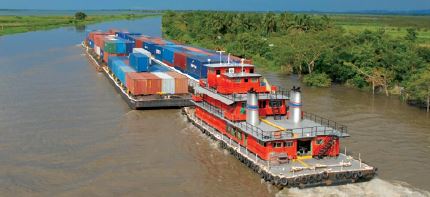[vc_row][vc_column width=”1/2″][vc_column_text]
Caribbean Single Market and Economy
For those whose knowledge of history extends no further than Hollywood fantasy, the Caribbean will summon images of swivel-eyed swashbucklers swigging rum with dusky maidens and shoving gold doubloons into their pirate pockets. The vision is fanciful, but has echoes today. From the moment Christopher Columbus’s small flotilla burst into the Caribbean seas in 1492, the region became the cockpit of a global struggle between European powers - with Spain, Portugal, France, Great Britain and Holland wrestling for supremacy. Slavery, exploitation, genocide and colonialism left their mark on this patchwork of tropical islands which can be traced today. The small nations of the Caribbean speak dozens of different European and indigenous languages. The also have diverse political systems and a variety of social problems, including poverty and crime. The Caribbean Single Market and Economy (CSME) came into being in 1989 when the leaders of these former colonies, who had struggled economically since independence, pledged to push for economic integration with the aim of eventually achieving a single market economy. The group consists of 12 member states: Antigua and Barbuda, Barbados, Belize, Dominica, Grenada, Guyana, Jamaica, St Kitts and Nevis, St Lucia, St Vincent and the Grenadines, Suriname, and Trinidad and Tobago. More than six million people live on this colourful collage of islands and small states, with Jamaica the largest member state. Shane J. Pantin, a lecturer in the history department at The University of the West Indies in Trinidad and Tobago, in his book, Ideology, Regionalism and Society in Caribbean History, advocates a uniquely Caribbean-style ideology, rather than an adoption of Western or European models, to develop a single entity from the vastly diverse communities. He believes that the people of the Caribbean must shake off much of this historical baggage and look forward to a united future if it is to survive and thrive on the global stage.
What trade deals are there with other countries and economic unions?
CARIFORUM - UK economic partnership agreement (from 01/01/2021)
[/vc_column_text][/vc_column][vc_column width=”1/2″][vc_column_text]Member Countries
Country | Population (2018) | GDP Growth (2021, %) | Date Joined |
|---|---|---|---|
103,050 | 5.2708 | 03/07/2006 | |
286,388 | 1.4000 | 01/01/2006 | |
382,444 | 9.7532 | 01/01/2006 | |
74,308 | 6.5357 | 03/07/2006 | |
108,339 | 5.3163 | 03/07/2006 | |
782,225 | 19.9272 | 01/01/2006 | |
2,898,677 | 4.6000 | 01/01/2006 | |
55,850 | -1.0246 | 03/07/2006 | |
179,667 | 6.5993 | 03/07/2006 | |
110,200 | 0.7351 | 03/07/2006 | |
568,301 | -3.4787 | 01/01/2006 | |
1,372,598 | -0.9853 | 01/01/2006 |
Recovering the Magdalena River Waterway: Challenge Accepted
Loading, Please Wait!
This may take a second or two.















































































